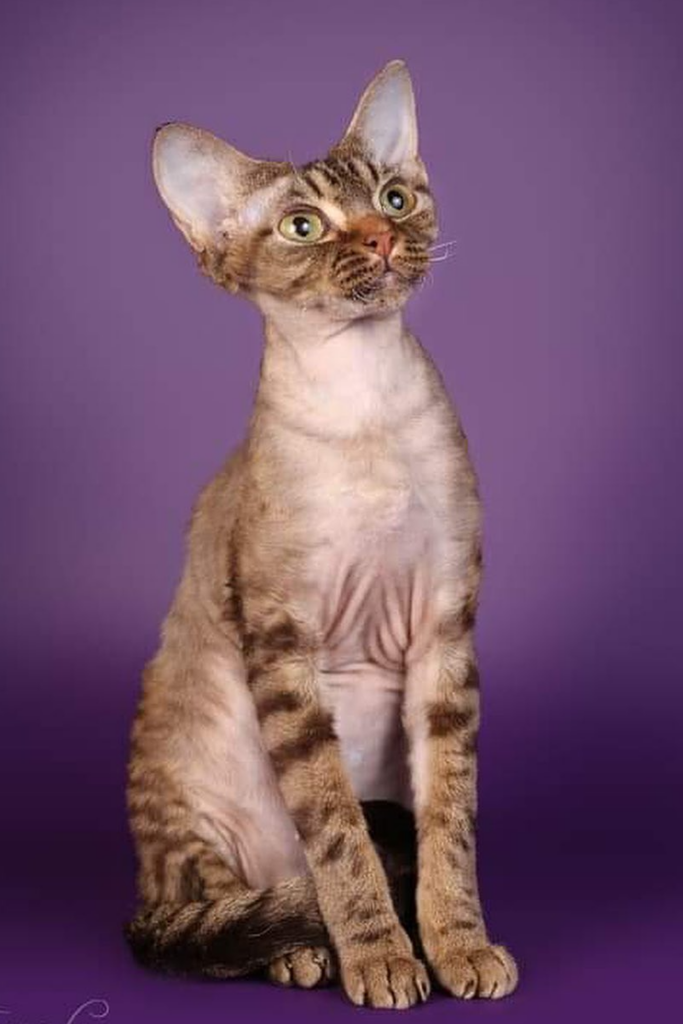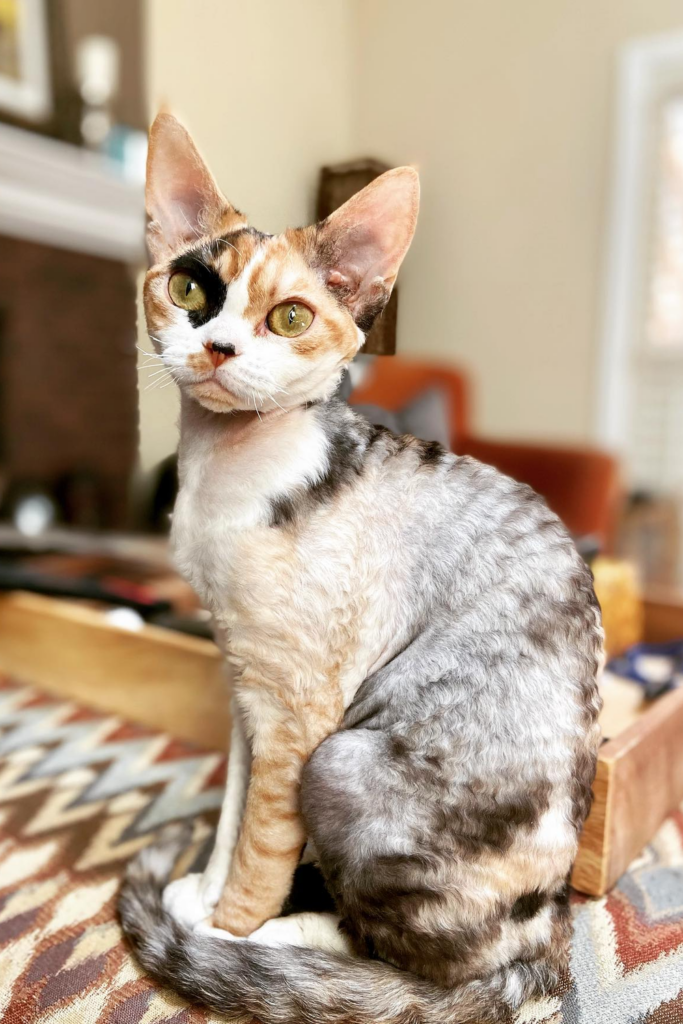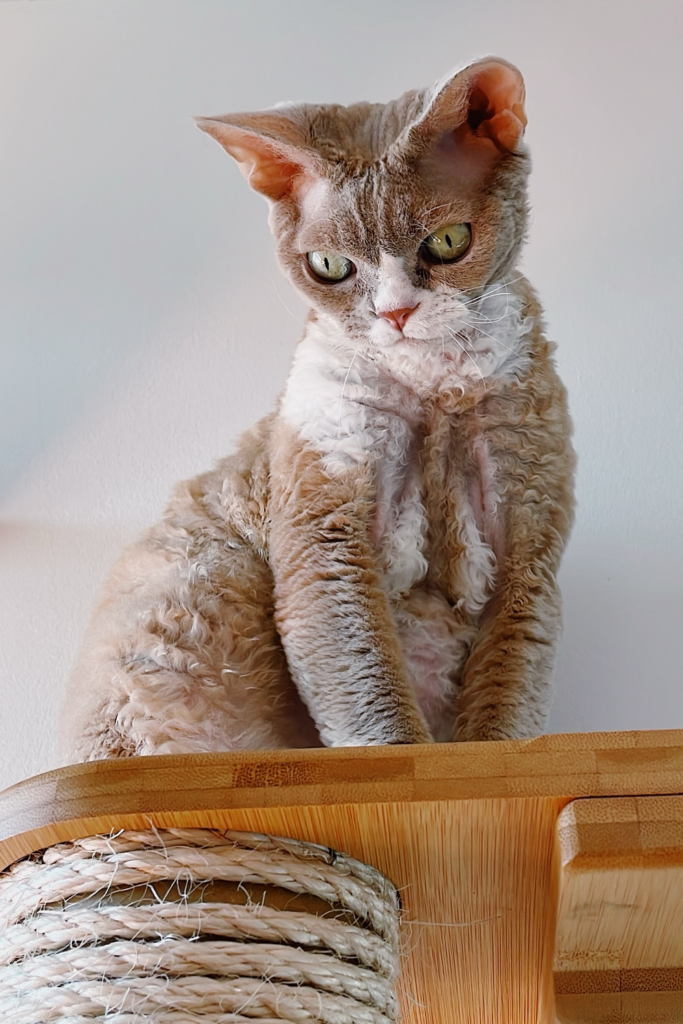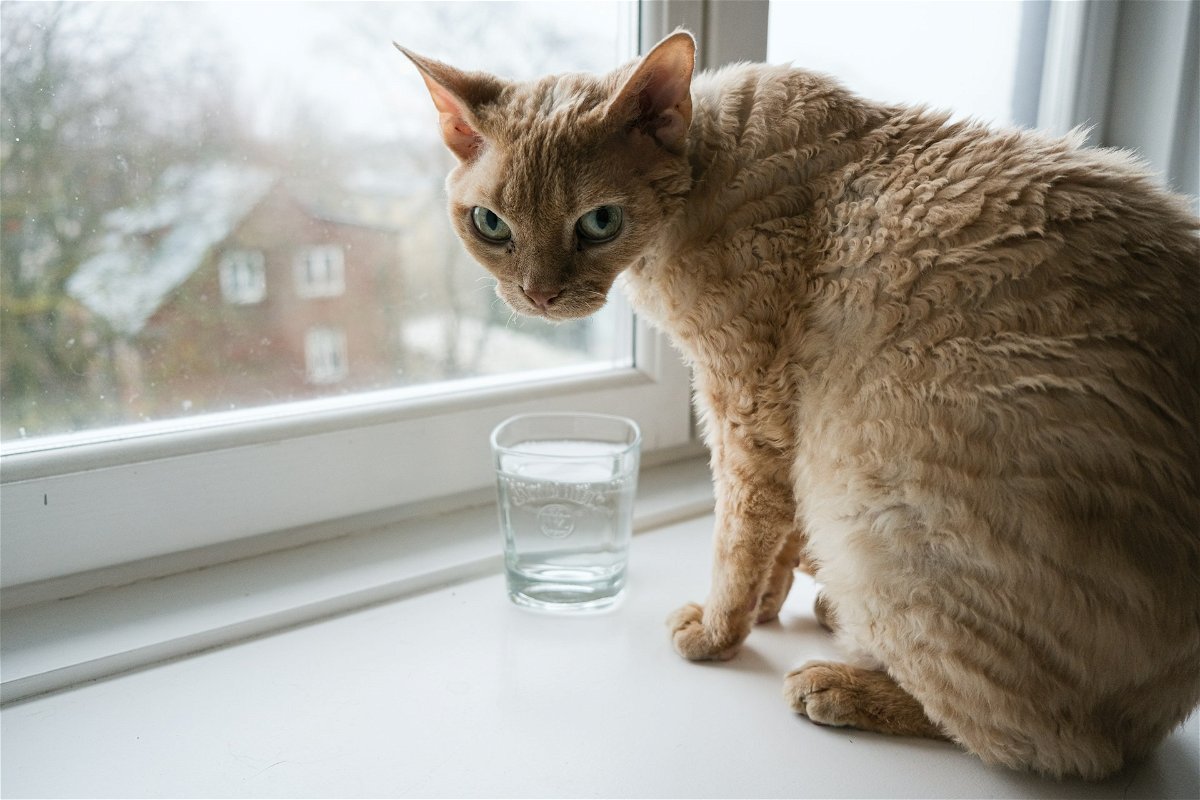We're an affiliate
We hope you love the products we recommend! Just so you know, we may collect a share of sales or other compensation from the links on this page at no additional cost to you. Thank you if you use our links, we really appreciate it!
‘Rex’ is a Latin word with a double meaning. First, it describes rabbits and cats with a specific type of curly coat, and the second definition means a King.
True to both definitions, Devon Rexes have a curly coat and exude a king-like command in their households, often earning them royal treatment.
Devon Rexes have risen in demand and popularity because of their unique physical appearance and affectionate personality.
Are you thinking about adding one of these beauties to your home? Here are 7 things to know before adopting a Devon Rex cat.
9 Things to Know Before Adopting a Devon Rex Cat

1. The History of Devon Rexes
Compared to other breeds, the Devon Rex is a relatively young cat breed with origins in Devon, England during the early 1960s.
They come from a natural genetic mutation where a curly-coated, brownish-black kitten named Kirlee unexpectedly appeared in a litter of straight-haired kittens.
Unlike his straight-haired siblings, Kirlee sported a unique curly coat, the first of its kind documented amongst non-pedigree cats.
Kirlee found a loving home with Miss Beryl Cox and Miss Margaret Croll in Buckfastleigh, Devon. In 1960, a chance encounter with an article in the Daily Mirror changed everything.
The featured article highlighted a curly-coated kitten named Du-Bu Lambtex, claiming she was the only one in Britain.
Recognizing their Kirlee’s unique similarity, Miss Cox quickly contacted the kitten’s breeder, Mrs. Agnes Watts, leading to the ‘discovery’ of Kirlee and a turning point in the history of the Devon Rex breed.
2. Appearance
The natural mutation of Devon Rex cats dramatically altered their exterior appearance, which is one of the leading highlights of the breed.
Aside from their coat, you’re likely to notice the oversized ears, giving Devons a distinctive appearance.
They also have a wedge-shaped head with high cheekbones and a broad skull supported by a thin neck, exuding strong facial features.

Devon Rexes have incredibly delicate whiskers and eyebrows that break easily, leaving them with a naturally short-furred facial look.
Normal cats have three hair types: guard, awn, and down. The guard hair is usually the roughest and longest. The Awn is shorter and smooth, while the Down hair is fuller and softer.
Unlike other felines, Devons rock the softer Down hair and lack the longer Awn and Guard hair types. This gives the Devons a shorter coat that is extremely soft to the touch.
3. Devon Rex Cat Breed Personality
Like other Rex cats, Devons are incredibly intelligent and have an insatiable curiosity about the world around them.
It’s because of this high feline IQ that the Devon Rex cat breed can be taught a few fun tricks and taken through command training.
Devon Rexes are always ready for an interactive game. Their high energy fuels their love of games and affectionate nature.
Devon Rex cats desire endless attention and affection. This breed could be a great choice if you’re ready to dedicate time and love,
Despite their loving demeanor, you can expect a Devon Rex cat to have a few mischievous streaks especially when left alone for extended periods.
4. Health Considerations
Devon Rexes are generally healthy breeds with an average life expectancy of about 9 – 15 years. But just like other purebred cats, they can be prone to acquire certain health problems.
- Hypertrophic cardiomyopathy (HCM)
Devons can be susceptible to acquiring Hypertrophic cardiomyopathy (HCM), a common heart disease affecting other felines.
This chronic disease poses a danger because it often develops silently, especially in its early stages. Symptoms like difficulty in breathing and coughing could be warning signs.
Early diagnosis and prevention are key in managing this heart condition. Devon Rex breeders should perform genetic testing on parent cats to reduce the chance of kittens inheriting this disease.
Always verify health testing results from a reputable breeder. You can also pick up an at-home DNA testing kit from your veterinarian and perform the genetic test yourself to erase all doubts.
- Hip Dysplasia
Devon Rexes are energetic and active cats, so it’s pretty much easy to notice if they have an early onset of hip dysplasia.
An affected feline can show reduced movement or limping. They are likely to avoid using the stairs or engaging in activities that they previously did without straining.
A potty-trained cat with hip dysplasia may start eliminating outside the litter box due to the pain incurred when using the box.
Hip dysplasia is a genetic condition that stems from the malformation of the ball-and-socket joints connecting the cat’s hip and thigh bone (femur).
There aren’t many options when it comes to preventing and treating hip dysplasia. The best thing you can do is ensure your Devon Rex is not overweight.
Maintaining regular exercise and activities should be an important part of your cat’s daily routine to strengthen their hip joints.
Your veterinarian might prescribe anti-inflammatory medication and supplements like glucosamine and chondroitin to support your cat’s joint health.
Worrying cases of hip dysplasia in cats can be addressed by surgical procedures to replace the damaged hip joint with a prosthetic implant.

- Luxating Patella
Patella luxation is another inherited condition that can affect Devon Rex cats. This genetic condition occurs in cats with a patella (kneecap) that can move out of its normal position (luxating).
Besides the birth defect, blunt physical trauma on the cat’s knee can also cause the patella to dislocate.
For physical trauma causes, the clinical signs will become evident immediately. However hereditary cases can take time to evolve as the cat grows older.
A luxating patella can cause pain, inflammation of the joints, and possible mobility issues including premature arthritis.
Your vet may recommend various strategies to manage a dislocating kneecap on your cat including maintaining a healthy weight, using joint supplements, and other pain relief therapies.
- Polycystic Kidney Disease
Polycystic kidney disease (PKD) is a hereditary condition in which fluid-filled cysts (sacs) form within the kidney tissue of affected Devon Rex cats.
These liquid-filled sacs tend to grow and multiply with time eventually leading to potential kidney failure because the normal kidney tissues become damaged.
Devons affected by Polycystic Kidney Disease (PKD) can experience diminishing appetite, increased thirst, frequent urination, nausea, vomiting, sudden weight loss, or muscle wasting.
Cats with PKD experience a unique pattern of cyst development. The number of cysts, the size of the sacs, and how quickly they grow can vary significantly.
Knowing the devastating implications of PKD, you should always check with a reputable breeder for the health clearance of parent cats before adopting a kitten.
5. Feeding a Devon Rex Cat
Devon Rexes are huge food lovers. These cats empty their food bowl in minutes and join you at the dining table for more.
Devon Rexes, with their incredible jumping abilities, will take any opportunity to snag a tasty treat from your kitchen. So, don’t be surprised if that unattended roast chicken mysteriously disappears.
Most vets recommend feeding a Devon Rex cat two to three times a day, depending on your cat’s age, activity level, type of food, and serving.
Rexes are prone to eat too fast which can cause them to regurgitate their food, so it’s a good idea to invest in a slow feeder.
Besides making them mealtime longer, a slow feeder can help keep your Devon Rex cat engaged in doing what they love, and prevent boredom.
We recommend sticking to high-quality cat-specific food with generous amounts of proteins and antioxidants.
Keep off foods containing wheat, milk, dairy products, corn, and artificial ingredients. Visit your vet for more tailored advice on what to give your Devon Rex cat.
For good dental health, it’s recommended to brush their teeth at least once a day and use some tasty dental chews to control plaque.
6. Grooming Needs for Devon Rex Cats
Devon Rex cats don’t need a very extensive grooming routine, thanks to their wavy coat. You can use a rubber brush to remove dead coat hair.
The gentle strokes made during routine brushing also help in distributing natural body oils all over the cat’s coat.
You should incorporate occasional wipes using pet wipes or a damp piece of clothing to give your Devon Rex a fresher look.
Inspect your cat’s ears often and use a vet-approved ear cleanser and a soft cotton ball to remove dirty wax and debris that may cause infections.
7. Exercise Needs for Devon Rex Cats
Devon Rexes are high-energy breeds who need lots of exercise to stay happy. Many owners have described their Rexes as being perpetual kittens because of their everlasting need to play.
Be prepared to supply enough interactive toys to keep your Devon active, without which they can turn your valuables into playthings.
8. Temperature Sensitivity
Because they lack Guard hair, Devon Rexes are not naturally insulated against the cold. Their short wavy coat makes them sensitive to the cold, therefore they should be kept indoors most of the time.
Devons need a warm bed to heat up during the night, although many will appreciate snuggling with their owners in one comfy bed.
9. Parasite Control on Devon Rexes
Like any cat, Devon Rexes can catch icky bugs and worms. These can come from fleas, ticks, ear mites, or even contaminated water or soil.
Since some of these parasites can spread to humans too, it’s important to be proactive. Regular vet checkups with a fecal exam will help detect these parasites.
Ask your vet for a year-round tailored program designed to eliminate internal parasites from your Devon Rex cat. This is especially important if you live in a warmer climate.
Conclusion
And there you have it! These are the 9 most important things to know before adopting a Devon Rex cat.
Remember Devon Rexes are extremely social and affectionate felines and will happily follow you around for cuddles and playtime..
Many people say Devons have a dog-like friendliness which makes them a favorable choice for people who value companionship.
Related Read:
Laura is the founder of Furs'n'Paws. She is a also a pet writer and expert with more than 20 years of experience of working with dogs and cats. She developed a very strong love for animals at a young age. Her passion led her to establish a thriving pet sitting and dog walking business in Dubai. As an expert in pet training, behavior, and nutrition, Laura is committed to helping pet owners and pet lovers by offering high-quality information on a wide range of topics.



No responses yet